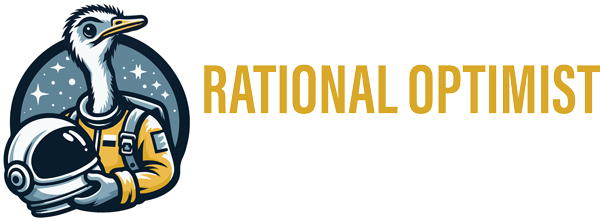The first nuclear SMR will be…
- Stephen McBride
- Sep 14, 2025
- 7 min read
And we’re “teleporting”
After one week off to move my family to Abu Dhabi, I returned to a pile of breakthroughs so thick I didn’t know where to start.
Welcome to the innovation avalanche!
Today we’ll look at exciting happenings in three areas I’m most excited about: nuclear SMRs, cloud seeding, and “teleportation.”
Plus, a personal note on why I left Ireland.
It’s really happening… the 2nd atomic age is dawning.
We rational optimists are huge supporters of nuclear energy, and have written at length about how it is the cleanest, safest, most reliable energy source.
America turned its back on nuclear in the 1970s for no good reason. Finally, we’re righting this wrong, and the wins for nuclear just keep coming.
The Department of Energy has launched its Nuclear Reactor Pilot Program, selecting ten startups to build America’s first wave of small microreactors (SMRs). Its goal is to get three SMRs up and running by July 4, 2026 – America’s 250th birthday.
That’s only 10 months from now!
I’ve met founders and executives from six of the ten selected startups. Many of these names will sound familiar to Rational Optimist Society members:
Last Energy
Atomic Alchemy
Deep Fission
Which company will turn on America’s first SMR? I’m working on a Deep Dive research piece to answer that. I’m convinced at least one of the above companies, and as many as 3, can meet the July 4, 2026 deadline.
Exciting times. For the first time in half a century, startups will be allowed to build and operate test reactors. The SMR industry is coming to life before our eyes:
Google-backed Kairos Power struck a deal with the Tennessee Valley Authority to connect a next-gen reactor to its grid by 2030. This is the first time a utility has agreed to buy power from an SMR startup.
Radiant announced a deal with the US military to deliver the world’s first portable microreactors to power Air Force bases.
And Aalo Atomics recently broke ground on Aalo-X, its first nuclear power plant beside Idaho National Laboratory.
Three years ago, Aalo was one guy in a WeWork looking at nuclear sketches. Now founder Matt Loszak is building a real reactor next to the lab where America has tested its most daring nuclear ideas since the 1950s.
We can’t talk about America’s nuclear renaissance without mentioning the company fueling it. I told you about General Matter, the startup solving America’s nuclear fuel crisis.
When we met in Detroit, I asked General Matter founder Scott Nolan, “Where did you get the idea to make nuclear fuel?”
Scott was an early investor in Radiant. One day he realized every SMR startup faced the same brick wall: they couldn’t get the highly enriched uranium they needed.
Scott did the most American thing possible…
He built the missing link.
General Matter is reviving Paducah, Kentucky – aka ‘Atomic City’. For decades Paducah supplied nearly a hundred reactors. Then we shut it down and started buying fuel from Russia. General Matter just announced that it’s reopening the plant.
Their mission? Make American enrichment great again.
Energy is the master resource – the bedrock of every other innovation. To re-industrialize America, we must first flood the nation with cheap, clean, reliable power.
Then add water…
“We can turn the whole of Arizona green.”
“And we can do it in less than a decade.”
That’s Rainmaker founder Augustus Doricko’s vision.
I introduced you to Augustus and his cloud seeding startup after meeting with him in Detroit.

Cloud seeding has been around since the 1950s. But the big breakthrough came in 2017 when scientists finally proved cloud seeding could make it rain.
The key insight: more than 90% of the water vapor in clouds never falls. It just evaporates back into the sky.
Rainmaker targets that wasted water in cold clouds using high-resolution radar. Then it flies in its custom-built drone and sprays a few grams of seeding agent into the clouds.
Those droplets freeze into snowflakes that grow heavy and fall. If the air below is warm, they melt into rain.
I view Rainmaker as a 21st century utility. But instead of making power, it makes water. That matters. Because water is now a hidden bottleneck of innovation.
One Google AI datacenter uses ¼ of the water in northeast Oregon.
TSMC’s Arizona chip fab requires millions of gallons a day.
Cue the scaremongering media!

Rainmaker has the antidote: Make more water.
Last winter in Oregon, after months of crashing test drones and sleeping on mattresses in a freezing warehouse, Augustus and crew proved their tech works.
Utah has hired Rainmaker to help refill the shrinking Great Salt Lake.
Its goal is to create around ten billion gallons of water in six months. That’s roughly the output of America’s largest desalination plant.
As Augustus put it:
The biggest weather modification program in the world outside China will begin this year, and Rainmaker is running it.
If Rainmaker succeeds in Utah it will do more than replenish lakes. It’ll show everyone America can still solve tough, real-world problems.
And no, cloud seeding isn’t dangerous. It doesn’t involve “chemtrails” or “dimming the sun”. Scientists have studied the safety of the spraying agent, silver iodide, for 80 years. And Rainmaker is working on biodegradable alternatives to make it even safer.
While entrepreneurs like Augustus, Matt Loszak and Scott Nolan invent the future of power and water, the innovators at Osmo Labs are…
Giving computers a sense of smell.
Huh? This sounds like sci-fi: Osmo has achieved the first “teleportation” of scent.
I’m a sucker for a good smell: fresh coffee in the morning, the smell of rubber in the gym, uncorking an old bottle of wine. Smells are deeply personal. They trigger memory more powerfully than any other sense.
But scents have been stuck in a pre-photography era. We couldn’t capture or share them. Osmo is changing that.
Osmo built an AI model that predicts how a molecule will smell just by looking at its chemical structure. The system can “imagine” scents without ever touching the physical molecule. Then it turns that data it into a formula, sends it to a specialized printer, and literally prints the smell.
Osmo’s first demo involved a slice of coconut. It analyzed the coconut’s scent on one side of the room, turned it into “smell code” and printed the same scent on the other side. Like a fax, but for smell.
For the first time, we can capture a scent in one place and re-create it somewhere else.
Imagine sending scents with your iPhone in five years the way you send photos today.
Digitizing smell opens up three wild possibilities.
The smell of you. Osmo’s Generation platform can turn anyone into a perfumer. You tell its AI what you want, and it produces a fragrance that’s yours alone.
The sniff test. Counterfeiters can copy how something looks. It’s harder to copy how it smells. Osmo built a probe that can smell the difference between a real luxury sneaker and a fake in 20 seconds.
New medical tests. Our bodies constantly emit tiny molecules through breath and skin that hint we’re getting sick. That’s why dogs can smell some cancers. Once smell is digital, imagine a pocket reader that flags early signs of illness.
I chatted with Ed Mehr, founder of Machina Labs last week. His mission is to make the future more expressive. “Look around today and most cars look the same, most buildings blur together. I want to build world where everything can be unique.”
Osmo is building something unique – but instead of bending steel like Machina Labs – it plans to fill the world with new unique scents, making it a better place.
Something else that makes the world better….
Air conditioning.
Since moving to Abu Dhabi, I’ve realized:
Air conditioning is one of the greatest inventions in history.
I couldn’t live here without it. It’s 110°F in the sun. Your shirt sticks to your back after a 30-second walk. Life here should grind to a halt in mid-day. But it doesn’t because everywhere is cooled to a comfortable 72°.
When people ask why I left Ireland for the desert, the short answer is: my kids.
A/C turned the Gulf from an uninhabitable desert into a thriving metropolis. Then there’s Europe, where many people genuinely believe breathing cold air is dangerous.
In France it’s illegal to run the A/C if the temperature is below 78.8°F. This summer German and French schools closed early because classrooms were too hot.
Heat now kills an estimated 175,000 people in Europe each year. Their lack of A/C is an emergency. Did you know Europe’s heat death rate is nearly twice as high as America’s firearm death rate?
To quote my favorite political leader of all time, Singapore’s Lee Kuan Yew:
Air conditioning was a most important invention for us, perhaps one of the signal inventions of history. Without air conditioning you can work only in the cool early-morning hours or at dusk.
It’s the same for Abu Dhabi. Without A/C, it would still be a backwater.
Of course, I didn’t leave Ireland for A/C. It’s a sign of something deeper. Abu Dhabi embraces innovation. Europe never met a new technology it didn’t try to regulate out of existence.
I want my kids to grow up in a society that understands innovation = prosperity. Despite one of the world’s worst climates, the UAE built one of the world’s best countries.
Prosperity starts with freedom… like the freedom to walk inside on a blazing hot day and feel a rush of cool, dry air.
Finally, if you want to know where technology and the world are headed…
Follow the innovators sleeping on factory floors.
Watch what they’re building.
For a decade-plus our best and brightest young adults sat on bean bags, optimizing ads and clicks. Today a new breed of get-your-hands-dirty founders is welding microreactors, teleporting smells, and making it rain.
That’s why I’m so bullish on the near future. If even a fraction of this stuff works, our kids and grandkids will grow up in a cleaner, safer, more prosperous world.
Now, a personal request: please tell me which of these innovations you’d like to read more about in the comments below.
Then forward this ROS Diary to a friend to share a hit of rational optimism. Word of mouth is how this community grows.
See you next Sunday.
—Stephen McBride
Stephen McBride is a co-founder of the Rational Optimist Society.



